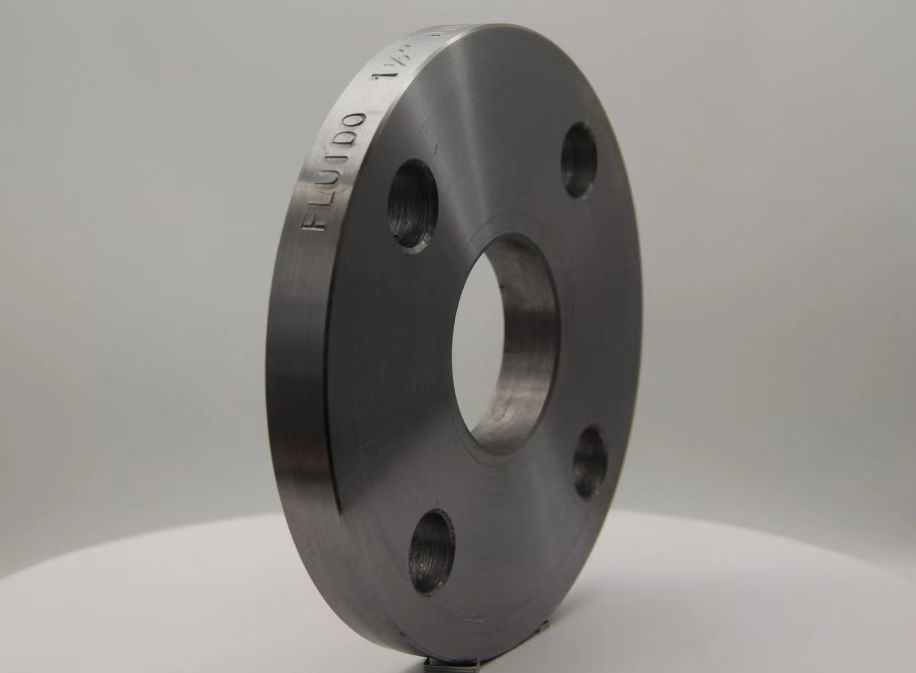Export Office: 21Floor, No.5 Nanhai Zhi Road,Qingdao, Shandong ,China
Work Shop: Beian Industrial zone, Qingdao,Shandong,China
+86 532 88550859
Joe
Inquiry now
Flat face flanges are a type of flange where the sealing surface is flat, providing an effective means of connecting pipes, valves, pumps, and other equipment to form a piping system. These flanges are distinguished by their smooth, flat mating surface which enables uniform distribution of bolt stress. This design characteristic is pivotal in ensuring a leak-proof seal, particularly when combined with appropriate gaskets. Typically made from robust materials such as stainless steel, carbon steel, or alloy steel, flat face flanges are lauded for their simplicity, ease of installation, and ability to safely convey fluids at moderate pressures and temperatures.

Common Applications and Industries
Flat face flanges find extensive application across numerous industries due to their reliability and adaptability. In the maritime sector, they are essential for aligning and securing piping systems aboard ships. The chemical processing industry uses these flanges to handle a variety of chemical substances without risk of leakage. Similarly, in water treatment plants, flat face flanges are integral to maintaining pipeline integrity under varying pressure conditions. These flanges are also prominent in HVAC systems, facilitating seamless connections between ducts and pipes to ensure effective heating and cooling.
Challenges Associated with Flat Face Flanges in Varied Environments
High-Pressure Environments
Potential Risks and Failures
While flat face flanges are highly effective in moderate pressure scenarios, their performance can be challenged in high-pressure environments. The primary risk lies in the potential for flange face bending or warping, leading to misalignment and subsequent leakage. The uniform distribution of bolt stress becomes even more crucial in high-pressure settings, as any inconsistency can cause gasket failure. Additionally, the continuous pressure exerted on the flange may result in material fatigue, and over time, this can compromise the integrity of the connection.
Material Considerations for Enhanced Durability
The selection of appropriate materials is imperative for mitigating the impact of high pressure on flat face flanges. High-strength alloy steel or duplex stainless steel are advisable due to their exceptional load-bearing properties and resistance to deformation. These materials can endure extended periods under high pressure without experiencing fatigue. Investing in premium quality materials can markedly enhance the durability and dependability of flat face flanges when subjected to high-pressure environments.
High-Temperature Conditions
Thermal Expansion Impacts
High-temperature environments present unique challenges for flat face flanges, primarily due to thermal expansion. The continuous exposure to high temperatures can cause the flange materials to expand, affecting the dimensions and fit of the flanges. This expansion can lead to misalignment, making it difficult to maintain a tight, leak-free seal. Over time, the fluctuating temperatures can also stress the flange material, potentially leading to cracks and other structural failures.
Prevention of Warping and Deformations
To prevent the adverse effects of thermal expansion, it's essential to use materials that possess high thermal stability. Grades like stainless steel and Inconel are known for their excellent performance under high temperatures, as they maintain their structural integrity and resist warping. Employing thermal barriers or insulation can further protect flat face flanges by minimizing direct exposure to extreme temperatures. Regular monitoring and maintenance are also crucial to promptly address any signs of thermal-induced damage and ensure the continued efficiency of the system.
Corrosive Environments
Types of Corrosive Agents Affecting Flat Face Flanges
Corrosive environments present a significant challenge to the integrity of flat face flanges. Various corrosive agents, including acids, chlorides, and industrial chemicals, can deteriorate the material of the flanges. For instance, environments with high chloride concentration, such as marine settings, can cause pitting corrosion on stainless steel flanges. Acidic substances, common in chemical processing plants, can degrade flanges if they are not made from resistant materials. Understanding the specific corrosive agents present in the environment is crucial for selecting appropriate protective measures.
Protective Coatings and Materials for Corrosion Resistance
To combat corrosion, the application of protective coatings and the use of resistant materials are essential. Protective coatings like epoxy or polyurethane can act as barriers, shielding the flange surface from chemical exposure. Additionally, materials such as Hastelloy or titanium, known for their exceptional corrosion resistance, can be used for manufacturing flanges in highly corrosive environments. Implementing these measures significantly extends the service life of flat face flanges and ensures reliable operation in harsh conditions.
As a leading manufacturer and exporter specialized in steel valves, fittings, pipe couplings and flanges, FLUIDO has been serving 35+ countries/regions for over 20 years. In addition to manufacturing its own flanges, FLUIDO also established partnership with factories in Shandong and Hebei, so as to provide customers with a full range of products and one-stop sourcing services.
Best Practices for Using Flat Face Flanges
Proper Installation Techniques
Alignment and Surface Preparation
Correct alignment and surface preparation are critical for the proper installation of flat face flanges. Ensuring that the flange faces are perfectly aligned prevents excessive stress on the connections and reduces the chance of leaks. Surface preparation, including cleaning and smoothing the mating surfaces, ensures a tight seal when the gasket is installed. Neglecting these initial steps can lead to significant operational issues and increased maintenance requirements.
Bolt Tightening Sequences to Prevent Leaks
A precise bolt tightening sequence is vital to ensure an even distribution of pressure across the flange joint. Gradual tightening in a crisscross pattern avoids distorting the flange and ensures uniform compression of the gasket. This technique minimizes the risk of leaks by maintaining consistent contact between the flange faces and the gasket. Adhering to recommended torque specifications is essential to prevent over-tightening, which can damage the flanges and gaskets.
Regular Maintenance and Inspection Protocols
Identifying Early Signs of Wear and Damage
Regular maintenance and inspection protocols are paramount for the longevity and reliability of flat face flanges. Routine checks can identify early signs of wear, such as corrosion, gasket degradation, or bolt loosening. Detecting these issues early enables timely interventions, preventing more severe failures and downtime. Implementing a scheduled maintenance program helps in systematically monitoring the condition of the flanges and addressing any problems before they escalate.
Using Compatible Gaskets and Seals
The use of compatible gaskets and seals is crucial for maintaining the integrity of flat face flanges. Selecting gaskets that match the operating conditions, such as pressure, temperature, and chemical compatibility, ensures optimal performance. Incompatibility between the gasket material and the flanged system can result in leaks or premature gasket failure. Ensuring that seals are correctly fitted and regularly inspected as part of the maintenance routine avoids operational disruptions.
Technological Advancements in Flat Face Flanges
Innovations in Materials Science
Recent advancements in materials science have led to the development of more durable and resilient flange materials. Innovations such as superalloys and composite materials offer enhanced resistance to high pressures, temperatures, and corrosive environments. These advanced materials provide extended service life and reduced maintenance needs, making them ideal for demanding industrial applications.
Enhanced Design Features for Greater Safety
Modern design improvements in flat face flanges focus on enhancing safety and performance. Features such as integrated gasket retainers and advanced sealing mechanisms help in achieving a more reliable seal. Additionally, flanges with built-in thermal expansion joints or flexible elements can accommodate environmental stresses, reducing the risk of structural failure. These design enhancements contribute to safer and more efficient piping systems.
Environmental Impact and Sustainability Considerations
Eco-Friendly Material Options
The increasing focus on sustainability has led to the exploration of eco-friendly material options for flat face flanges. Materials that are recyclable or have a lower environmental footprint, such as certain grades of stainless steel or bio-based composites, are gaining popularity. Using environmentally-friendly materials not only reduces the carbon footprint but also aligns with global sustainability goals.
Reducing Waste through Effective Use and Recycling
Implementing effective use and recycling strategies significantly reduces waste associated with flat face flanges. Practices such as refurbishing damaged flanges, reusing components, and recycling materials at the end of their service life contribute to a circular economy. Establishing recycling programs and encouraging manufacturers to design flanges with recyclability in mind can further promote sustainability in the industry.
By addressing these various factors and employing best practices, industries can overcome the inherent challenges of using flat face flanges in specific environments. Through careful material selection, advanced technologies, and sustainable practices, the efficiency and longevity of flat face flanges can be significantly enhanced.
All products undergo thorough inspection prior to shipment. FLUIDO is proud to be certified under the international ISO9001 quality management standard, ensuring adherence to stringent quality criteria and industry norms. Upholding our belief that "trust originates from quality," we have successfully achieved ISO9001 certification along with SGS quality management registration. Moreover, our valve and flange products carry European CE certification.
Export Office: 21Floor, No.5 Nanhai Zhi Road,Qingdao, Shandong ,China
Work Shop: Beian Industrial zone, Qingdao,Shandong,China
+86 532 88550859
Joe
© 2020 Qingdao Fluido Industrial Co.,Ltd. All Rights Reserved. Qingdao fluido valve

